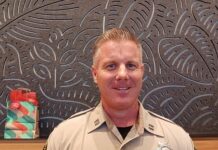When Mark, a husband, father, grandfather and retiree arrived at Tri-City Medical Center’s emergency room, he was completely surprised to learn that he was having a stroke. While he was undergoing a computed tomography (CT) scan to confirm the diagnosis, Laura Desadier, DO a neurohospitalist at Tri-City, could see the images of the blood clot in his brain on her phone through VIZ.ai, a HIPAA compliant software program that uses artificial intelligence (AI) to accelerate care coordination and is integrated with the hospital’s CT scanner. Immediately, everyone that would be involved in his care knew that this was a thrombectomy case and that he needed life-saving treatment, as they were all connected to the VIZ.ai program on their phones. As Tri-City’s Thrombectomy Capable Stroke Center operates 24/7 and is supported by neurologists, neurosurgeons, interventional radiologists, stroke nurses and other experts, “they did not hesitate to help me and did it at lightning speed which I’m sure is the reason for my speedy recovery,” said Mark.
“This technology allowed us to streamline the workflow so that we could take the patient from the scanner, immediately start thrombolytic therapy and then take him to the interventional suite to remove the clot,” said Dr. Desadier. “When a patient is having a non-bleeding ischemic stroke, time is brain. By that I mean the faster a patient begins clot-dissolving drugs and clot retrieval procedures, the greater the chances are that we can save brain tissue and help the person to better recover.”
In the acronym B.E.F.A.S.T. , which is used to identify a stroke, the “T” stands for “time” as every second counts; 911 should be called immediately so that the person can get to the hospital quickly and receive intravenous tissue plasminogen activator (IV t-PA) within three hours of symptom onset. According to the American Stroke Association, the other F.A.S.T. warning signs are:
Balance: signs are dizziness, sudden trouble walking, or loss of balance
Eyes: signs are trouble seeing or a sudden change in vision
Face: one side of a person’s face droops, resulting in an uneven smile
Arms: one arm drifts downward when a person tries to raise both arms
Speech: a person’s speech is slurred when asked to repeat a simple phrase
As the first hospital in North County to earn the the Gold Seal of approval as a Thrombectomy-Capable Stroke Center (TSC) certification from The Joint Commission, in collaboration with the American Heart Association/American Stroke Association (AHA/ASA), Tri-City has met rigorous standards for performing mechanical endovascular thrombectomy (EVT), a specialized surgical procedure that saves lives by removing blood clots from the brain during an ischemic stroke. Additionally, Tri-City has been recognized with both the Target: Stroke Honor Roll and Target: Type 2 Diabetes Honor Roll award by the American Stroke Association for using thrombolytic therapy within 60 minutes in 75 percent or more of applicable acute ischemic stroke patients.
“Having a certified TSC in North County is critical to the health of our local residents,” said Dr. Desadier. “We make it a point to educate first responders, as well as the community, that when it comes to stroke, you really should bring a person to Tri-City, as it is the only certified TSC in North County. Our team can begin treatment immediately without having to transport the patient to another facility for EVT. The faster a person gets help can mean the difference between a full recovery and long-term disability or death.”
“As a neurohospitalist, I only see patients in the hospital who are experiencing neurological disorders, like a stroke,” added Dr. Desadier. “I am still amazed when I see a patient in the morning sitting up in bed and eating breakfast after spending the night in the ICU recovering from a stroke. Most patients don’t remember me from when they came in because we were busy doing everything we could to save their life. They often can’t believe they’ve had a stroke and ask how soon they can go home.”
Most patients will need some type of rehabilitation therapy following a stroke. Tri-City is one of the few hospitals to offer an acute rehabilitation program as part of its stroke care program. A multidisciplinary team will determine the best course of treatment for each patient and start three hours per day of rehab as soon as possible to improve recovery before the patient is discharged.
“I always tell people we can’t regrow the brain after a stroke – we have to retrain the brain,” said Dr. Desadier. “Through early and aggressive rehab with physical, occupational and speech therapy, and support from their families, patients do so much better. From the minute they come through the door suffering with symptoms of a stroke until they leave, we can offer patients so much more now than ever before in stroke care. ”
“I am eternally grateful to Tri-City Medical Center for the excellent care I received,” said Mark. “The entire staff was fantastic, and I’m convinced that they were all watching out for my best interests for a speedy recovery from my stroke. Mission accomplished.”
May is National Stroke Awareness Month
According to the American Stroke Association, the most common type of stroke is ischemic, caused by a clot that is blocking the blood supply to the brain. A transient ischemic attack (TIA), also known as a mini stroke, is caused by a temporary, but serious clot. Clots form when fatty deposits line the blood vessel walls; this is called atherosclerosis. There are numerous risk factors for stroke including high blood pressure, smoking, diabetes, obesity, high cholesterol, an unhealthy diet and heart disease. Stroke is the fifth leading cause of death in the United States; in 2019, someone died of stroke every 3 minutes 30 seconds. The risk for stroke is nearly twice as high for blacks as it is for whites, and it increases with age. Women have a higher risk for stroke than men.
Click to learn more about stroke awareness and the services offered at Tri-City Medical Center’s Stroke Care Center.



















